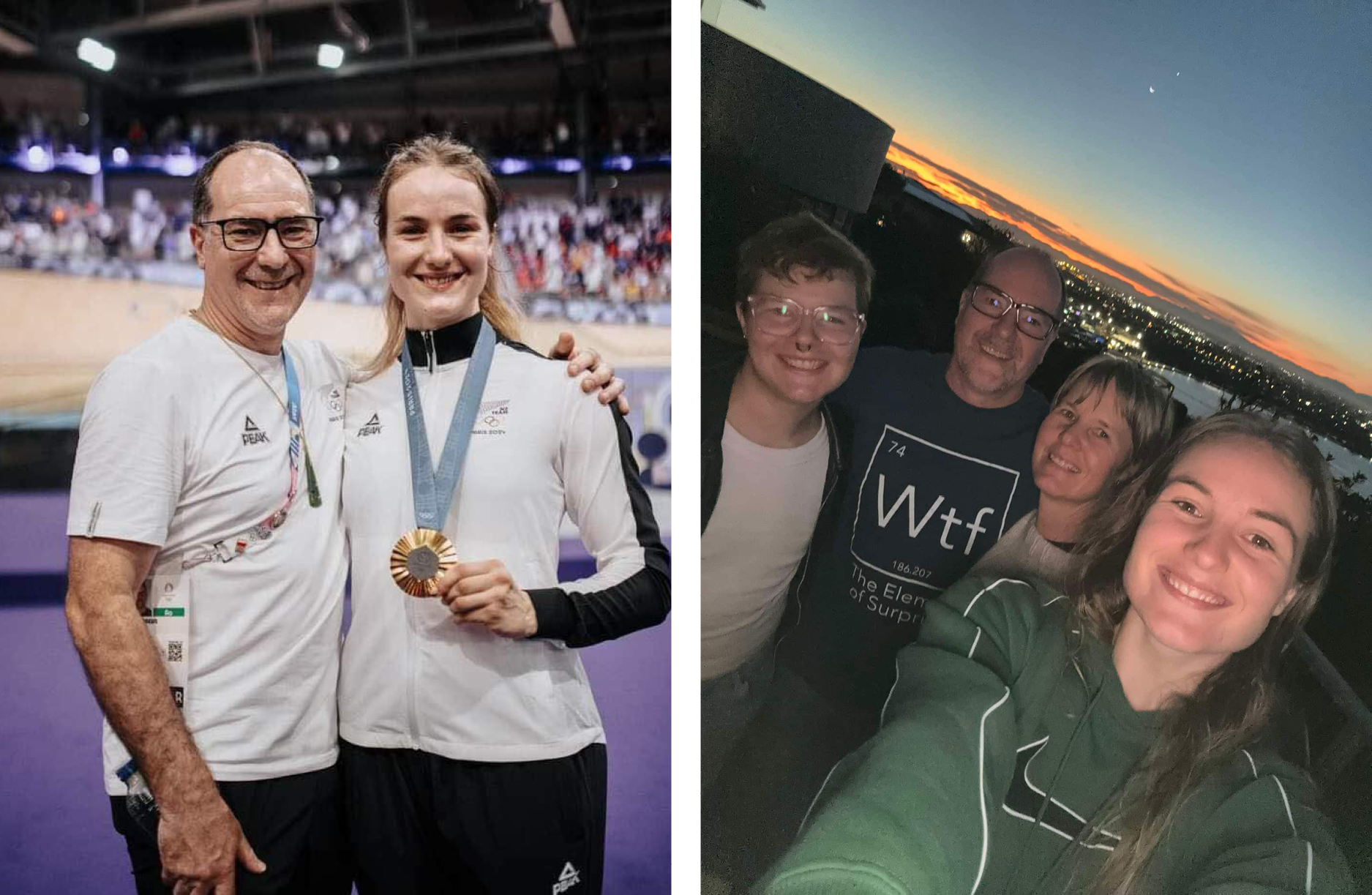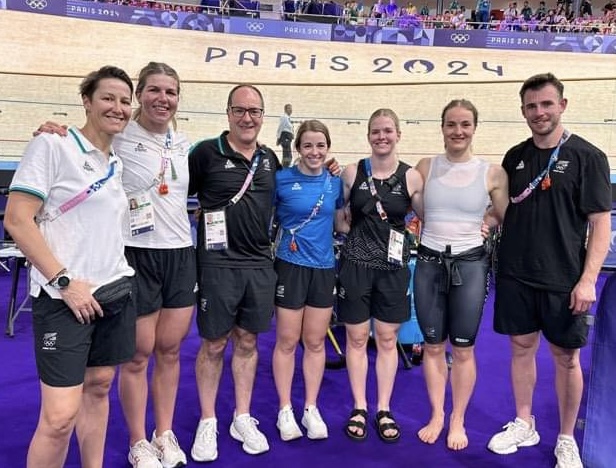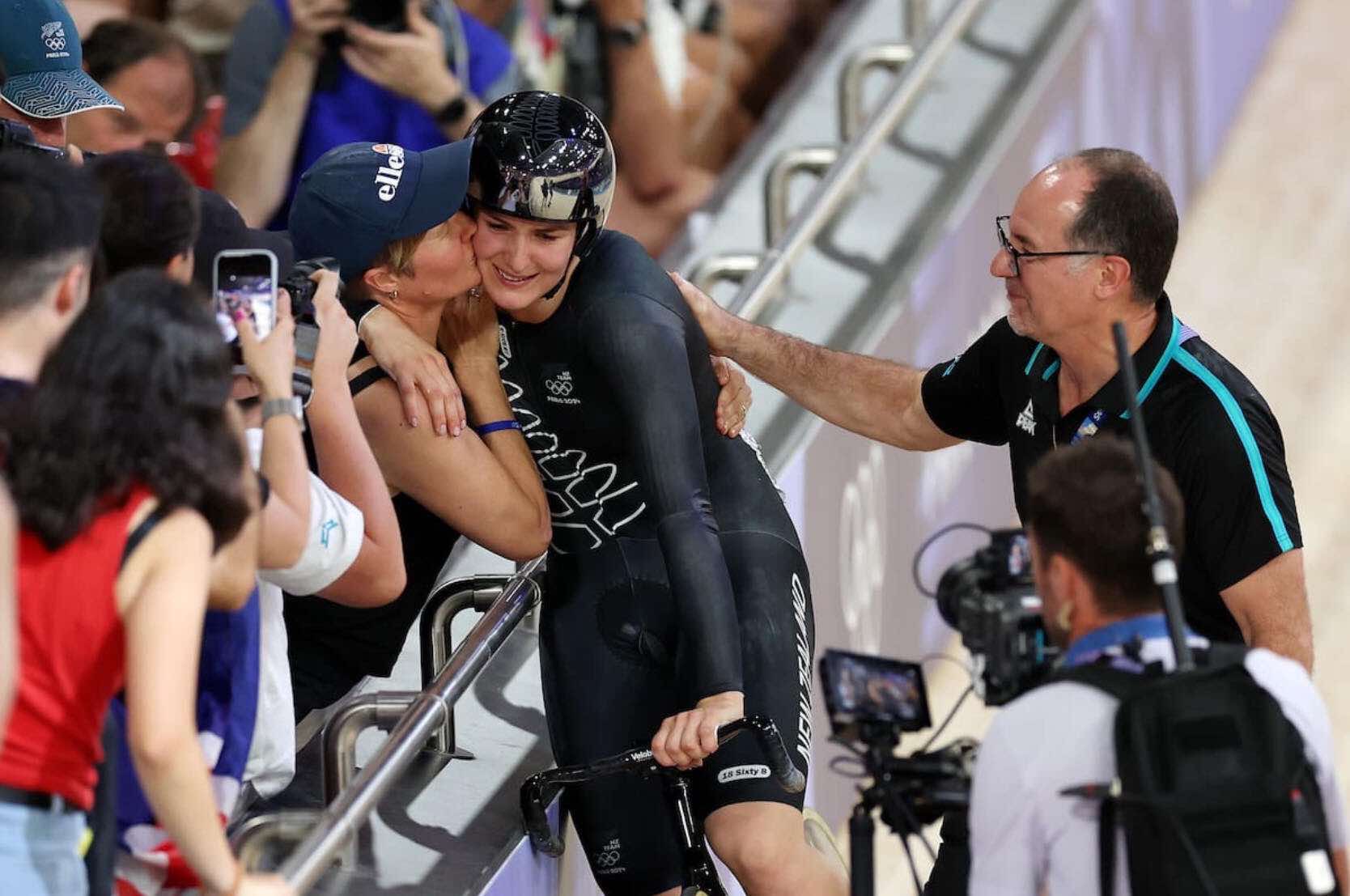Jon Andrews
Jon Andrews
- Coach Profile
A now or never moment led Jon Andrews on the greatest ride of his career and following seven exhilarating days at the Saint-Quentin-en-Yvelines Velodrome in Paris he became New Zealand’s most successful Olympic cycling coach.
As the Lead Sprint Coach of a small team of four women – daughter Ellesse Andrews, Rebecca Petch, Shaane Fulton and Paris reserve Olivia King – and sole male Sam Dakin, Andrews had little time to prepare for what was to become New Zealand’s best-ever Olympic Games return on the cycling track, in 2024.
Spearheaded by the exceptional performances of daughter Ellesse, who bagged two gold medals in the keirin and sprint, and silver in the team sprint where she had fearless backing from Petch, who was the fastest first-lap rider of all nations in the team sprint and the massive engine of Fulton, the women were narrowly pipped for gold in the team event.
In all, the track cycling team bagged a record five medals in Paris, with an unexpected opportunity opening the door for Andrews.

Depending on his situation at the time, Andrews has spent his working life ducking between coaching and IT (Information Technology) worlds and after finishing his role with the Queensland Academy of Sport, where he coached Australia’s development sprint group, in March 2023, thought his days as a coach were done.
“I was resigned once again that that would probably be the end of my coaching career,’’ he said.
“Then unexpectedly the (NZ) national sprint coach resigned about a year before the Paris Olympics, so that job became available and I was really keen to put my hand up for that.
“So, I did, was successful and you could say the rest is history. That was a really successful time for the team and for myself with coaching. It was really a culmination of everything that I had done in my coaching career, especially putting into practise a lot of the things I had been doing in Queensland. I took a lot of that work into the New Zealand team and we did really well with that work.’’
A former double Commonwealth Games sprint cycling medallist and Olympian, Andrews won bronze medals in the individual sprint and 1000m time trial at the Auckland Games in 1990 and competed at the 1992 Barcelona Olympics.
As with many young cyclists, Andrews worked in a bike shop and was drawn to coaching at an early age.
“I used to talk to a lot of people in the shop and was involved a lot in the local racing scene,’’ he said. “There wasn’t a lot of coaches in New Zealand that were really familiar with sprint cycling performance. And there was a need with some keen and talented young kids in Canterbury, so with the need there, I slowly stepped into advising athletes and then coaching.’’
He moved into local regional coaching straight after retiring as a competitor. His own success had come on the back of looking at things through a slightly different lens in terms of research into the science of the time and training habits. And Andrews wanted other athletes to benefit from what he had learnt.
From 1994 – 97, Andrews coached around the Canterbury region before quickly moving up the chain and taking on the role as assistant coach for the national sprint team where he stayed until 1999 in the lead-up to the Sydney Olympics.
Things changed with the birth of daughter, Ellesse.
“Back in those days it was very amateur in the way that we were operating and I was coaching virtually as a part-time, almost a volunteer, basically,’’ Andrews said.
“I was studying an IT degree and with the arrival of Ellesse, studying, earning a decent income and paying the mortgage was more important and I actually stepped away from coaching for 14 years.
“I had quite a break from it and was thoroughly into my IT at the time, finishing my degree and then working.’’
It wasn’t until Ellesse started riding (at age 12 – 14), then started racing that Andrews “could see a bit of potential there,’’ and got involved in coaching again very quickly.
“She was loving her sport, doing well and I had a lot of new ideas based on what I had done previously, embracing technology a little bit more and my ability to put a little bit more of a scientific lens on it than I had in the past and it was successful,’’ he said.
From 2016 – 19, he was head of the national under-19 programmes and regional performance hub for Waikato and Bay of Plenty, based in Cambridge and happily left IT behind.
“After that, I needed to step away from Cambridge a little bit. It was a difficult time in the sport and my wife Angela and daughter Zoe weren’t loving Cambridge, so we went back to Christchurch,’’ Andrews said.
“At that stage I was happy to go back into IT. It’s been a really great career for me because I’ve been able to have some sort of reliable, steady income through that work if it was needed. And if a coaching opportunity came along, then I had the flexibility most of the time to just do that.’’
That lasted a year before he was tapped on the shoulder for a position in Australia and coaching the development sprint group for the Queensland Academy of Sport (QAS).
“I deliberated over that, I was really keen to be involved, was missing the sport and I thought if I ever wanted to be involved with a New Zealand national team again I really needed to be working in the sport somewhere, practising my craft and not sitting behind a desk solving computer problems,’’ Andrews said.
“So, for two season (18 months) I went to Brisbane and coached the team there and was really successful. That was a super time because part of that period was during Covid, so for the first four months of my work I was stuck in New Zealand because the borders were closed in both countries and I couldn’t travel.
“But it gave me some really good thinking time where I could sit down and think about what I had done in the past, what had worked and how I’ d like to proceed and progress that work into a next phase. And came up with some ideas.’’

Given a free rein at QAS, Andrews adopted a lot of their structure but also implemented ideas of his own which he thought would be successful, and they were.
He won a world championship with the boy’s national under-19 sprint team in the teams’ event, the girls being second in the team event and one of the boys second in the individual match sprint event.
He had been in the job for about 18 months but Angela and I decided that a family move to Brisbane wasn’t what we wanted to do long-term, so Andrews returned to New Zealand “and I once again headed back into my IT work.’’
With immaculate timing, that coincided with the national sprint role becoming vacant and once successful, he had just a few short months to overhaul the sprint team’s programme in the lead-up to the Paris Olympics.
“Previously, I had been watching from the outside and with Ellesse being my daughter, I’d get some insights into what they were doing,’’ Andrews said. “That was interesting to me because I could see some things that the team were doing that I didn’t agree with and didn’t think were particularly beneficial for performance.
“Fortunately, the team’s level of preparation physically was really, really good but there were a number of things I thought they could improve on. So, I had a pretty short runway with that.
“I didn’t change anything initially because I needed time to settle in, also to work with the riders, determine what they thought they needed to do and where they thought the programme was deficient.
“So, it was building a new culture and trust with the athletes. There was a lot to do in a really short amount of time. But I knew all the athletes and had coached all but one of them before, in their junior years and that definitely helped because they had some trust in me and we’d had some success in the past.
“By April ’24, all of the sprint group had qualified for Paris. The women had been fifth at the world champs the year before (2023). They were ranked fifth in the world for team sprint but they had potential to do more.’’
With a few disasters around injuries, it was all hands to the pump in getting the athletes into the best possible shape during the build-up.
“They gradually progressed with some super work from our physio team so by the time we left New Zealand to go to our pre-Olympic camp in Switzerland, the girls were already sitting right on the current world record for that time, already performing really well in training,’’ Andrews said.
“When we were in that camp we had a trial and the women’s team broke the world record in training. So, that was a great indication that things were continuing to improve, that the girls were still well on the up and we still had more gas in the tank.
“So, we arrived in Paris really confident about what we could do. The initial training days on the track were really good and the only problems we encountered we managed to solve quickly.’’
The omens couldn’t have been any better when the women’s sprint team opened their campaign with a silver medal-winning performance.
“Nobody had really expected the girls to perform to that level so it was just a fantastic kind of feeling,’’ Andrews said.
“They rode super well in the final but they couldn’t quite put another ride together in the same way. We probably didn’t quite have the training depth that we needed to deliver another ride. But a silver medal at the Olympics was beyond our expectations, and was awesome, kind of dream material stuff.’’

Every day just got better for the coach as firstly, Ellesse powered to the victory in the keirin final a day later, followed by a similar showing in the women’s sprint where Ellesse reached hallowed turf to become a double Olympic gold medallist.
“It was kind of weird though because every day – the competition was seven days long for us – and we pretty much had competition every day, so I just had to stay stable because every day we’d have another job to do the next day, and the next day and the next day,’’ Andrews said.
“We allowed ourselves to enjoy the moment but we needed to keep a bit of a lid on things until the very end.
“Ellesse’s sprint final was one of the very last events of the Games, so we had to hold ourselves together right until the last moment. By then it was an exhausted relief and just a little bit of a stunned feeling with what we had achieved.’’
With time to reflect and dissect, there’s no doubting the Paris Olympics sit front and centre of Andrews’ extensive coaching resume but he also credits the bigger team as integral to the unprecedented success of the campaign.
“To be able to perform and lead the team, it’s leading the athletes, but it’s also leading all the staff that helped put the performances together,’’ he said. “The coach is the leader, not the main person, but just the person who pulls everyone together and helps create the vision and makes sure the work is done to bring it all to life.
“So, to do that successfully was just a coach’s dream.’’
Andrews credits his own coach as a young cyclist, the late Wayne Thorpe, and former All Blacks and Black Ferns coach Wayne Smith as influential figures in helping shape his own coaching philosophies.
“Wayne Thorpe was a really interesting coach because everything he did was from observation, common sense, good human values and working with people. Nothing was based on science. He was great and really cared. He was super influential,’’ Andrews said.
“But there’s also guys like Wayne Smith who I’ve listened to a number of times, talking about culture, creating teams and creating really good environments for people to thrive in. I’ve taken a lot of that on board…..it’s a very important part of the environment I like to create.
“I always say I’m not a sports scientist, I’m not a strength and conditioning coach, I’m not a physio, I’m a guy that raced, I’ve got some good observations about the skill of cycling and working with people, and that’s what I really love.
“But I really need a good team around me of professionals that are sports scientists, strength and conditioning experts and physios to bring everything to life.’’
Thinking his career was over not so long ago, Andrews is now firmly ensconced in Cycling New Zealand’s Lead Sprint Coach seat believing his team can only get better and is focussed on leading them through to the 2028 Los Angeles Olympic Games.